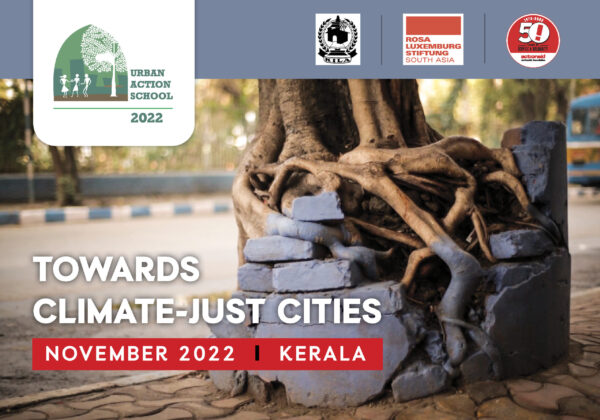
A One Week Course for Urban Activists and Policy Makers
21st to 27th November 2022
Venue: Kerala Institute of Local Administration (KILA), Thrissur, Kerala, India
Last Date of submission of application – 10th October 2022
We invite applications for
Urban Action School (UAS) 2022: Towards Climate-Just Cities, the one-week course covering various aspects of urban climate justice action with a focus on the cities of the Global South. This course has been designed essentially for mid and senior-level activists, policy advocates, lawyers, journalists, researchers, and all categories of urban policy practitioners. We have designed UAS’22 to benefit action researchers and social activists, build the participants’ knowledge base, and complement action research and field-based activism. We hope that UAS’22 becomes a space for knowledge upgradation, reflection, sharing and equipping the participants to acquire new skills to function better in their day-to-day work. In addition, we seek to make a difference to the participants and organizations/movements where they work.
The 21
st Century is often referred to as an urban century – cities will rise across the globe and define future trajectories of human civilization. With millions of people arriving in urban areas in the developing world every month and an estimated 70% of global GDP arising from urban areas, the proposition of an urban century does not seem farfetched. Another defining feature of the 21
st Century is climate change’s impact on human civilizations across the globe. Cities in developing countries would be disproportionately affected by the scarcity of water, eccentricity of precipitation and increasing temperatures. The poor and vulnerable would again bear a proportionately higher brunt of these changes, and their vulnerabilities would be enhanced. As India prepares for climate change-induced distress, we must focus on making sustainable and inclusive cities resilient against natural calamities resulting from climate change. The past few years have seen an increased number of climate disasters like excessive rainfall leading to massive floods, prolonged spells of drought, rising temperatures and increased frequency of cyclonic formations. Thus, there is an emerging necessity of looking into the policy planning focusing on climate resilience with issues of the poor and marginalized at the centre to achieve true ecological justice.
WHO CAN APPLY
The course is open to all, demonstrating a commitment to engaging with urban issues. Social workers, political activists, people working with community organizations, social movements, trade unions, urban local bodies, media persons, government officials, research students, and elected peoples’ representatives working and dealing with the ‘Urban Issues’ are eligible to apply for this course. Experienced participants are preferred for this course as it is essentially designed to build the skill of experienced activists and mid-career professionals.
COURSE STRUCTURE
Each year the course, the UAS curriculum, is redesigned to reflect the emerging ideas, issues, and concerns about a particular topic. The intention is to make each iteration of the UAS a credible and significant contribution towards the understanding of cities, citizens, and people-oriented sustainable planning with an attempt to deal with and find solutions to growing urban poverty, migration, alienation, exclusion, violence, and lack of regulation and planning.
Thus, the UAS 2022, on the theme of “Towards Climate-Just Cities”, will be an effort to further the social, ecological and environmental justice agenda in urban climate action. It aims to deliberate on the fair, creative and multidisciplinary approaches to urban climate justice and equity embedded in collective practices and actions.
TENTATIVE SCHEDULE
Day 1: From Urban Resilience to Climate-Just Cities: Locating Justice in Urban Climate Action
Urban Equity and Climate Resilience: The Conceptual Framing
Day 2: Climate Change Challenge in Cities: A View from the Global South
Climate Change Crisis in Cities of Global South: Issues and Concerns | Communicating Climate Change and its Impacts | Locating the Poor in Climate Action Policies: The Justice Lens | Impact of Climate Change on Indian Cities: Case Studies | Workshop
Day 3: Mapping the Climate Change Loss and Damage in Cities: Marginalization, Vulnerability and Intersectionality
Understanding Climate Change Loss and Damage in Cities: Key Debates and Issues | Disproportionate Burden of the Climate Costs: Impact on Vulnerable Communities | From Climate Change Loss and Damages to Compensation and Reparations: Outlining the Action | Workshop on Frameworks for Assessing Climate Change Loss and Damage in Cities
Day 4: Field Visits
Day 5: Collective Climate Action in Cities: A Pro-Poor Agenda
Urban Governance and Climate Action: A Pro-Poor Approach – Role of Local Government | Collective Action for Climate Justice in Cities: Role of CSOs and Citizen Groups | People-Centric Urban Climate Action: Best Practices and Case Studies
Day 6: People’s Protagonism for Urban Climate Justice: From Local to Global Action
Commons and Commoning for Urban Climate Justice: Solutions for Urban Climate Crisis | Climate Proofing Cities: Mainstreaming Urban Climate Justice | Community-Driven Climate Justice Initiatives | Workshop on Climate Litigation in India
Day 7: Reflections and the Way Forward
Group Presentation, Feedback and Strategy Building
ORGANIZERS
Kerala Institute of Local Administration, Kerala (
www.kila.ac.in)
Rosa-Luxemburg-Stiftung South Asia (
www.rosalux.de/en)
ActionAid Association India (
www.actionaidindia.org)
LOGISTICS
Only selected candidates will be called to attend the workshop based on applicant information and interaction with shortlisted candidates. The organizers will bear the workshop expenses, including course fees, accommodation, food and training materials.
We will provide need-based travel support based on individual requests after the shortlisting of participants.
APPLICATION PROCEDURE
Prospective participants may fill out the online application form available here:
Online Application Form and
Download PDF Application Form Alternatively, they can download the form, fill it and send it by
email or through the post to:
The Course Coordinator,
Urban Action School,
ActionAid Association,
F-5, First Floor Kailash Colony,
New Delhi -110048
We will only consider applications that reach us
latest by 10th October 2022 midnight (IST).
FOR QUESTIONS AND QUERIES, PLEASE WRITE TO:
The Course Coordinator, Urban Action School,
ActionAid Association,
F-5, First Floor Kailash Colony,
New Delhi -110048
Phone: +91-11-40640500; + 91-11- 40640505; + 91-11- 40640535
Mobile: +91-9873280838, +91-9038477566; +91-9811637221
Email: ajay.rana@actionaid.org, koustav.majumdar@actionaid.org, lakshya.yog@actionaid.org

